RomCon Report 1
From last week's guest post. Colleen & Shaun have announced Cindy as the winner of How to Write a Dick: A Guide for Writing Fictional Sleuths from a Couple of Real-Life Sleuths
What I'm reading: Silver Lies, by Anne Parker (book club); First Thrills (anthology), Lee Child (editor)
I'm writing this after nearly three full days of conference activities (especially if you count drive time in your day), so forgive any incoherence.
RomCon is a reader-focused conference, so very little in the way of craft type workshops, but a lot of information nevertheless.
First off, the conference has a 'buddy' program, where attendees are matched and an author is part of each group. I want to say how thrilled I was to meet and spend time with Heather, Donna, and Nancy, and I hope they weren't disappointed that they didn't get a more famous author assigned to them.
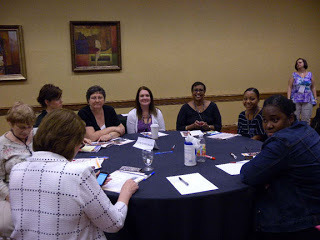
First event was a welcome, where Sue Grimshaw, who's always keeping her finger on the pulse of the marketplace took a brief survey of the group. Bottom line: almost every person at the conference reads both print and e-books, and shops in brick and mortar stores as well as on line.
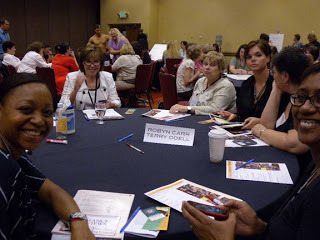
After that, I was one of the authors participating in a Build a Hero game. Two authors (I was fortunate to be paired with the wonderful Robyn Carr) sat at a table with a group of readers, and we were given worksheets to determine what a "perfect" hero would be. We discussed his appearance, background, fears, goals, desires, what he would never do, and any other characteristics we felt were important.
It was fun and interesting, as we were required to come to a consensus, and with ten individuals with ten different ideas of what makes a perfect hero, the discussions were both heated and funny. One thing we discussed was the fact that the worksheet didn't really have any place to consider the plot (although we kept getting sidetracked with plot ideas. It also didn't allow for the difference in the character at the beginning of the book compared with the ending.
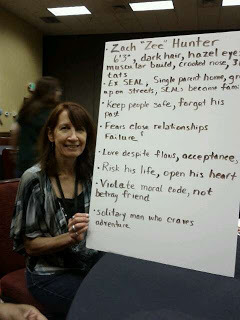 Our hero ended up being Zach "Zee" Hunter, a former Navy SEAL. He's got dark hair, green eyes, and a crooked nose, and is six-three. He grew up in a single-parent household and was a street kid. He joined the Navy to find the family he never had. He left the SEALs after he lost some of his men and is now driven to keep everyone safe. He's a loner, but doesn't realize that he really wants to be accepted, flaws and all. He'd do whatever it takes to keep people safe, and would never betray a trust.
Our hero ended up being Zach "Zee" Hunter, a former Navy SEAL. He's got dark hair, green eyes, and a crooked nose, and is six-three. He grew up in a single-parent household and was a street kid. He joined the Navy to find the family he never had. He left the SEALs after he lost some of his men and is now driven to keep everyone safe. He's a loner, but doesn't realize that he really wants to be accepted, flaws and all. He'd do whatever it takes to keep people safe, and would never betray a trust.
Each table (we were divided up by sub-genres) had to write all our points on a large white board, and then present our hero to the entire room. I volunteered to do the writing, and Robyn did our presentation. Of course, she managed to sneak in one of the points we were merely joking about – that our hero was impotent and he'd need the love of a very special woman to be whole again.
The organizer used the applause system to determine the winner. Of course each table cheered for its own creation, so the final decision was done by lottery. It was a great time!
The other activity of the day was a 3 track session hosted by Cindy Gerard and Tara Janzen on aspects of black ops in writing. They had a few guest speakers who are experts in weaponry, and they shared information (and lots of their toys) with the group.
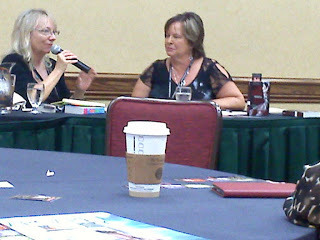
They also discussed some of the crafting issues in writing, and most carry over into any genre. Some takeaways:
Trust is always an issue.
Larger than Life heroes need Larger than Life Feelings.
Pet peeves in books: Using the Stupid Woman Plot Motivator. If your character is doing something stupid simply because you need it to make a plot point, nobody is going to believe or like the character. Not to say people don't do stupid things and make poor choices, but you can't create the foundation of a plot or scene based on stupidity.
Creating depth of character means showing honest emotions.
Another excellent point Tara made was that it's not simply action-reaction. In reality, it's action, emotion, thought, reaction. To make your characters realistic, if there's some kind of action, their immediate response is an emotional one. Then, they'll think, and then they'll act. If you show the emotions, and how they respond, then their reactions will be believable, and readers will care about the characters.
They also had lots of 'toys' for us to look at!
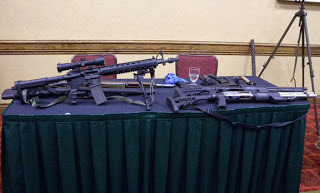
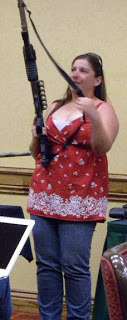 One very thought-provoking point was made by the guest speaker, who is an expert in just about anything weapon-related, and who has an extensive background in military and beyond. He stood before us in slacks, a jacket and tie, and asked how many weapons we thought he had on his person. Guesses ranged from three to about fifteen. After he removed several guns, knives, and the like, he said the correct answer was "one." His point was that a person's brain is his weapon, and all the other things he had were merely tools.
One very thought-provoking point was made by the guest speaker, who is an expert in just about anything weapon-related, and who has an extensive background in military and beyond. He stood before us in slacks, a jacket and tie, and asked how many weapons we thought he had on his person. Guesses ranged from three to about fifteen. After he removed several guns, knives, and the like, he said the correct answer was "one." His point was that a person's brain is his weapon, and all the other things he had were merely tools.
And, I was please that one of my blog 'regulars', Gun Diva, was also part of the program.
Like this post? Click the +1 button below and spread the word.
That's all for today – tomorrow, my guest is Sharon Hamilton, whose topic is Letting Go. I'll be back Wednesday with more – including what happened to Annuit Ollalong.
What I'm reading: Silver Lies, by Anne Parker (book club); First Thrills (anthology), Lee Child (editor)
I'm writing this after nearly three full days of conference activities (especially if you count drive time in your day), so forgive any incoherence.
RomCon is a reader-focused conference, so very little in the way of craft type workshops, but a lot of information nevertheless.
First off, the conference has a 'buddy' program, where attendees are matched and an author is part of each group. I want to say how thrilled I was to meet and spend time with Heather, Donna, and Nancy, and I hope they weren't disappointed that they didn't get a more famous author assigned to them.

First event was a welcome, where Sue Grimshaw, who's always keeping her finger on the pulse of the marketplace took a brief survey of the group. Bottom line: almost every person at the conference reads both print and e-books, and shops in brick and mortar stores as well as on line.

After that, I was one of the authors participating in a Build a Hero game. Two authors (I was fortunate to be paired with the wonderful Robyn Carr) sat at a table with a group of readers, and we were given worksheets to determine what a "perfect" hero would be. We discussed his appearance, background, fears, goals, desires, what he would never do, and any other characteristics we felt were important.
It was fun and interesting, as we were required to come to a consensus, and with ten individuals with ten different ideas of what makes a perfect hero, the discussions were both heated and funny. One thing we discussed was the fact that the worksheet didn't really have any place to consider the plot (although we kept getting sidetracked with plot ideas. It also didn't allow for the difference in the character at the beginning of the book compared with the ending.
 Our hero ended up being Zach "Zee" Hunter, a former Navy SEAL. He's got dark hair, green eyes, and a crooked nose, and is six-three. He grew up in a single-parent household and was a street kid. He joined the Navy to find the family he never had. He left the SEALs after he lost some of his men and is now driven to keep everyone safe. He's a loner, but doesn't realize that he really wants to be accepted, flaws and all. He'd do whatever it takes to keep people safe, and would never betray a trust.
Our hero ended up being Zach "Zee" Hunter, a former Navy SEAL. He's got dark hair, green eyes, and a crooked nose, and is six-three. He grew up in a single-parent household and was a street kid. He joined the Navy to find the family he never had. He left the SEALs after he lost some of his men and is now driven to keep everyone safe. He's a loner, but doesn't realize that he really wants to be accepted, flaws and all. He'd do whatever it takes to keep people safe, and would never betray a trust.Each table (we were divided up by sub-genres) had to write all our points on a large white board, and then present our hero to the entire room. I volunteered to do the writing, and Robyn did our presentation. Of course, she managed to sneak in one of the points we were merely joking about – that our hero was impotent and he'd need the love of a very special woman to be whole again.
The organizer used the applause system to determine the winner. Of course each table cheered for its own creation, so the final decision was done by lottery. It was a great time!
The other activity of the day was a 3 track session hosted by Cindy Gerard and Tara Janzen on aspects of black ops in writing. They had a few guest speakers who are experts in weaponry, and they shared information (and lots of their toys) with the group.

They also discussed some of the crafting issues in writing, and most carry over into any genre. Some takeaways:
Trust is always an issue.
Larger than Life heroes need Larger than Life Feelings.
Pet peeves in books: Using the Stupid Woman Plot Motivator. If your character is doing something stupid simply because you need it to make a plot point, nobody is going to believe or like the character. Not to say people don't do stupid things and make poor choices, but you can't create the foundation of a plot or scene based on stupidity.
Creating depth of character means showing honest emotions.
Another excellent point Tara made was that it's not simply action-reaction. In reality, it's action, emotion, thought, reaction. To make your characters realistic, if there's some kind of action, their immediate response is an emotional one. Then, they'll think, and then they'll act. If you show the emotions, and how they respond, then their reactions will be believable, and readers will care about the characters.
They also had lots of 'toys' for us to look at!

 One very thought-provoking point was made by the guest speaker, who is an expert in just about anything weapon-related, and who has an extensive background in military and beyond. He stood before us in slacks, a jacket and tie, and asked how many weapons we thought he had on his person. Guesses ranged from three to about fifteen. After he removed several guns, knives, and the like, he said the correct answer was "one." His point was that a person's brain is his weapon, and all the other things he had were merely tools.
One very thought-provoking point was made by the guest speaker, who is an expert in just about anything weapon-related, and who has an extensive background in military and beyond. He stood before us in slacks, a jacket and tie, and asked how many weapons we thought he had on his person. Guesses ranged from three to about fifteen. After he removed several guns, knives, and the like, he said the correct answer was "one." His point was that a person's brain is his weapon, and all the other things he had were merely tools.And, I was please that one of my blog 'regulars', Gun Diva, was also part of the program.
Like this post? Click the +1 button below and spread the word.
That's all for today – tomorrow, my guest is Sharon Hamilton, whose topic is Letting Go. I'll be back Wednesday with more – including what happened to Annuit Ollalong.
Published on August 08, 2011 04:00
No comments have been added yet.



